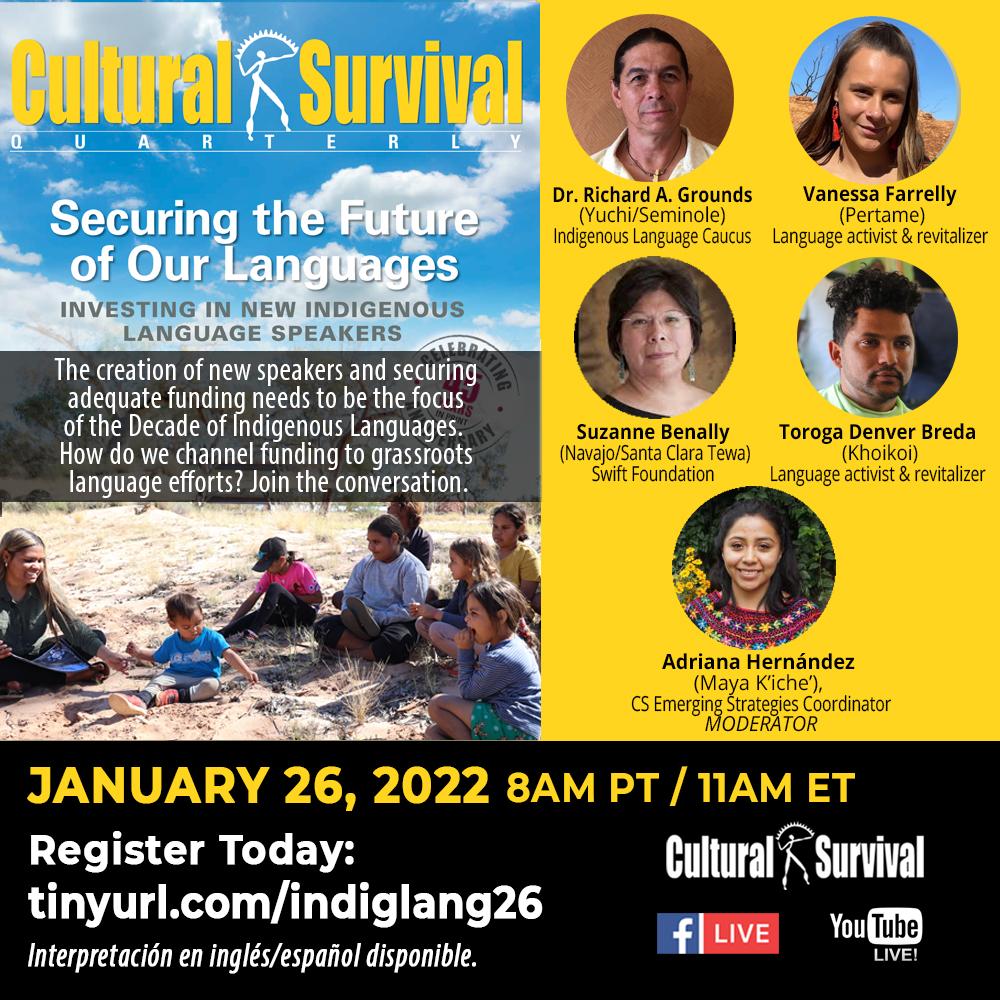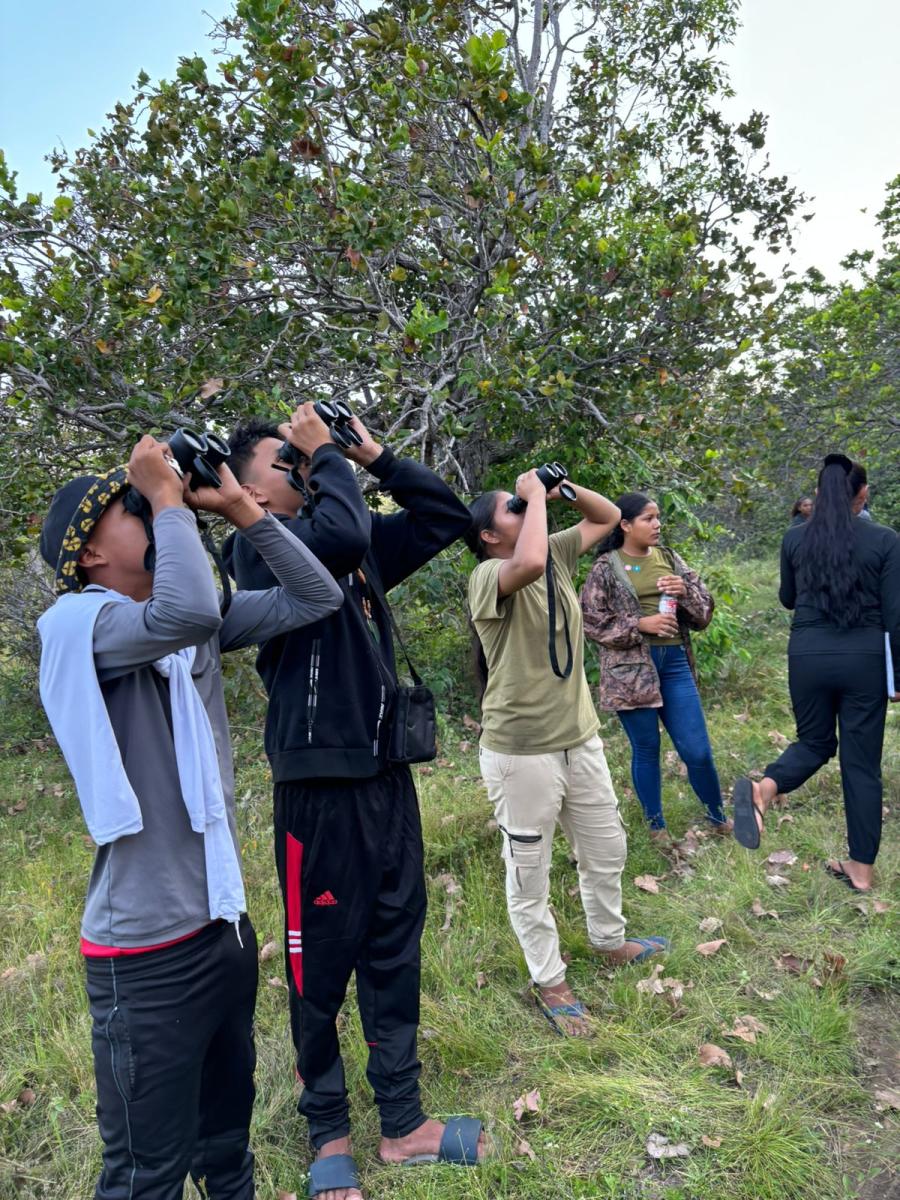
By Sarah Hume (CS Intern)
On January 26, 2022, Cultural Survival hosted a panel discussion titled “Securing the Future of Our Indigenous Languages” in honor of the International Decade of Indigenous Languages (2022-2032) as as a follow up to the most recent issue of the Cultural Survival Quarterly. Cultural Survival staff were joined by four panelists from across the globe who are working in their communities to revitalize their languages.
In October 2021, Cultural Survival held a virtual conference to share experiences and best practices on language revitalization. More than 30 practitioners from different backgrounds and geographical areas shared what they are doing in their communities. Many agreed that lack of funding was one of the key challenges in increasing the number of fluent speakers. As a final recommendation from the conference, many practitioners agreed that money needs to go directly to the communities, because that’s where the languages are spoken. Community members are the ones working to keep their languages alive.
This recent panel continued the conversation about funding, best practices, and the importance of language. Dr. Richard Grounds (Yuchi/Seminole), Executive Director of the Yuchi Language Project based in Oklahoma and the Chair of the Global Indigenous Languages Caucus, works with Yuchi Elders to create new fluent speakers in the community using immersion methods. By doing so, the Yuchi language has been brought back into homes. Grounds’ daughter speaks to her three children in Yuchi, for example, powerfully reclaiming the language after her great-grandmother went to a boarding school where she was punished for speaking Yuchi.
Grounds explained that the Yuchi Language Project focuses on keeping the language living in the community. The program values time with Elders rather than allowing non-Indigenous linguists to come into the community and extract information from Elders to make dictionaries or books. Knowledge instead remains within the community. Elders spend time with younger generations to pass the language on to them. Then, Grounds notes, these generations can later create a Yuchi dictionary if they choose.
“It’s not just about learning the language, it’s also about bringing our people together,” agrees Vanessa Farrelly (Pertame), the Pertame Research Officer within the Centre for Australian Languages and Linguistics of the Batchelor Institute of Indigenous Tertiary Education. She has been coordinating the Pertame Language Revival Program for four years. They use methods of immersion as well, where adults are taught Pertame so that they can teach it to their children and to the community. These Master-Apprentice sessions include adults spending 5 to 10 hours per week with a fluent Elder, doing activities like cooking and telling stories. The program also includes high schoolers interviewing their Elders, adult community classes, primary school classes, online resources and videos, community performances, and school holiday programs.“The whole time we’re laughing and telling jokes, and being together as a family,” Farrelly said. “It’s really beautiful. It’s such an honor that we get to learn our language in this way.”
One of the goals of the Pertame Language Revival Program is to increase the self-esteem of children who speak Pertame and to support the strong identity of the community. Farrelly discussed her hope that soon the program will be able to raise enough money to hire the Apprentices as full-time employees. Since everything is community-run, it is essential that Pertame speakers are given the opportunity to teach the language and continue learning it.
Suzanne Benally (Navajo/Santa Clara Tewa), current Executive Director of the Swift Foundation and former Executive Director of Cultural Survival for over eight years, continued to underline the need for funding grassroots language initiatives. Benally is also the co-chair of the Board of Directors of the International Funders for Indigenous Peoples and a Trustee of the Naropa University Board of Trustees. “Language courses are simply not enough. You have to learn to live the language and think in the language,” she said. “It takes a whole community effort to do that.”
Benally called for philanthropy to change in response to Indigenous Peoples. Benally described the importance of an Indigenous values and principles based grantmaking, including reciprocity, authentic relationship with communities, and holism. She expressed the need for a fundamental shift in funders’ perspectives so that resources go directly to the community and communities can determine how they are used. Funding needs to be significant or adequate, multi-year general support grants (meaning that it is not tied to any particular program). Benally further called for funding to be based on trust; it should not be tethered to the need for the Indigenous community to give reports to the philanthropic organization in order to receive necessary financial support. What Indigenous Peoples should not have to do, Benally argued, is educate philanthropists about the existence of Indigenous communities. Instead, she said, “philanthropy needs to seat Indigenous Peoples as their program officers and CEOs because we come with that experience.”
Toroga Denver Breda (Khoikhoi), a language revitalizer and poet who focuses his art on challenging the erasure of South Africa’s First Nation languages and stories, continued to speak to the perception that Indigenous Peoples are no longer. He noted that Khoi people are still recorded as being extinct. “Colonial academics will talk about us to us, acting as if we are no longer,” he said. He continued to explore the importance of language, noting that many carry historic traumas and unacknowledged pains from colonialism, but there is something so profound about being able to open up a dictionary and read the words of his ancestors out loud. It connects him to the land, his people, and to the history that they have been erased from. Living on stolen land like colonizers and colonial descendants do, he said, means that you have a responsibility to the people whose “tongues were taken away violently.” In many ways, the land and language are connected. Breda tells his nieces and the young generations that “We are not orphans on our own land. We come from this land.”
Grounds added to Breda’s acknowledgement of erasure, citing the history of North America and his own personal experience. When he was in graduate school, he found a dictionary of Native American languages in his library. He looked to see its information on the Yuchi tribe. It said that the Yuchi were extinct. Grounds called this the “colonial wishlist”— the idea that if Indigenous Peoples disappear, colonial claims to the land will be simplified. “An enormous, explicit funded project was used to destroy our languages over a period of generations,” Grounds said. “We’re talking about entire nation-wide boarding school systems. By today’s dollars, billions of dollars were spent destroying our languages. We need funding— something in that order— to bring back our languages.” Grounds’ prayer at the beginning of the panel, opening the space in a good way, reflected this history, using an expression that the founding Elder of the Yuchi language project used to open his prayer: “We Yuchi people— we’re still here.”
The Pertame Language Revival Program tried multiple times to get government funding but has never been successful, Farrelly added, because the Australian government is focused on resource production, and recording and archiving languages rather than teaching languages. Instead, the program received a large part of its funding from one philanthropic family who connected with the community. The family went for a weekend to spend time with the community and listen to their dream of having a place to teach. In the end, the family decided to give financial support with no strings attached, and created a beautiful relationship with the Apprentices and the community. Farrelly argued that there would be more opportunity in philanthropy if it was regularly about human connection like this. The Pertame Language Revival Program wants more experiences connecting with philanthropists on this personal level. One goal is to have them come to the Pertame community to be a part of the work that is happening there.
All panelists agreed that language carries identity, knowledge, and culture with it. Language includes an understanding of “how the world works and our place in the world,” as Grounds said. Breda described the peace he finds when learning Khoikhoi. He told a story about one night when he was alone with a bottle of wine— a dangerous place because alcohol problems run in his family— and he thought about drinking it. He then heard the voices of his ancestors telling him that if he drank it, he would forget and not be able to learn his ancestor’s words and languages. “We’re not just learning words,” Breda concluded. “We’re healing.” Grounds agreed. “Our outcomes are really in the laughter of our children,” he said. “It’s really in the joy of our young people being able to text back and forth in their language. Being able to tease, being able to pray.”
Cultural Survival extends our gratitude to our panelists and to all language revitalizers and practitioners working to reclaim and revitalize Indigenous languages across the world. For more information about the International Decade of Indigenous Languages, please visit here.
To learn more about the “Restoring and Protecting Our Languages and Native Landscapes” conference, please visit www.cs.org/lang2021.



